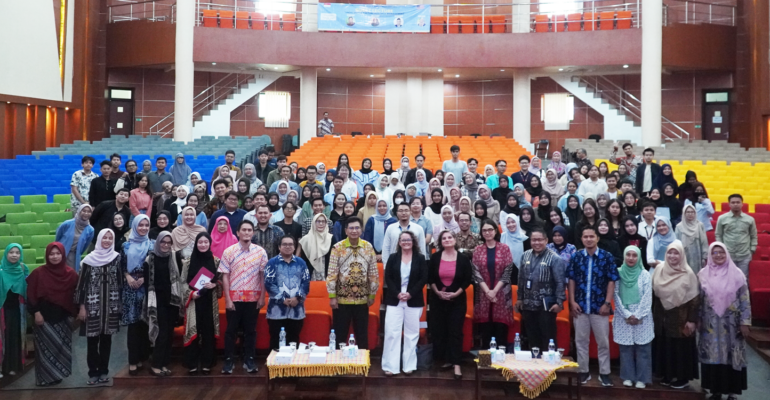Tropical Marine Economics Program of IPB University Designs Research Collaboration on Treasure Management with East Carolina University

Indonesia has been a significant maritime route since the 14th century, serving as a spice trade route in global navigation. Throughout this trading process, many ships carrying valuable cargo sank in the waters of the archipelago due to accidents or wars.
The potential of Shipwreck Cargo (BMKT) as a cultural heritage with high economic value has attracted the Tropical Marine Economics Study Program (EKT) at the Faculty of Economics and Management (FEM) of IPB University. In collaboration with the United States Embassy, they organized a public lecture titled “Underwater Cultural Heritage Management.”
The general lecture was delivered by Dr Jennifer McKinnon, an underwater archaeology expert from East Carolina University, USA. In her lecture, Dr Jennifer explained that underwater cultural heritage holds significant historical and economic value. However, this potential has not been fully explored in Indonesia.
Dr Jennifer emphasized the importance of local community involvement in preserving underwater cultural heritage and the need for various parties to be involved in its management. She also highlighted that expertise in archaeology could collaborate with marine economics to map and develop the existing economic potential.
“Collaboration between archaeology and tropical marine economics is crucial to maximize the benefits of underwater cultural heritage. By involving local communities, we not only preserve history but also create new, sustainable economic opportunities,” said Dr Jennifer.
Prof Tridoyo Kusumastanto, a Professor of Marine Economics at IPB University, underlined the importance of cross-disciplinary collaboration in managing underwater cultural heritage.
“The economic potential of BMKT is estimated to be around USD 12 billion. Data from the Ministry of Marine Affairs and Fisheries (KKP) shows that there are approximately 463 treasure points in Indonesian waters. Each location is estimated to have an economic value for underwater tourism ranging from USD 80,000 to USD 18 million,” he said.
Therefore, he noted, strong collaboration among all parties is necessary to harness the economic potential while preserving the historical value of this underwater cultural heritage.
This event received positive feedback from participants, who felt they gained new insights into the potential management and preservation of underwater cultural heritage. The discussions and Q&A sessions after the lecture provided opportunities for participants to delve deeper into the topic and exchange ideas.
Dr Kastana Sapanli, the Chairman of the EKT Study Program at IPB University, stated that this guest lecture is expected to encourage more research and collaborative projects in this field and raise awareness of the importance of preserving underwater cultural heritage in Indonesia.
The results of this activity will be followed up with research collaboration between the EKT Study Program at IPB University and the United States Embassy. Based on initial discussions, a study team will be formed to conduct research related to BMKT management.
“One of the locations that will be studied is Banten Bay, where an American warship sank during the war with Japan. It is hoped that the results of this research will serve as a foundation for managing and protecting BMKT, which has both economic and historical value,” he said.
He also said, “Thank you to Mrs. Yoana as the alumni coordinator of the US Embassy and Mrs. Nisa Ashila Ghaisani as the Experiential Learning Coordinator of the US Embassy who have connected and provided opportunities for alumni of US Government funded programs and exchanges, namely Mrs. Osmaleli SE, MSi, IPB University lecturer at the Department of Resource and Environmental Economics (ESL) and also an alumni of the EKT Study Program.” (*/Rz) (IAAS/RUM)



